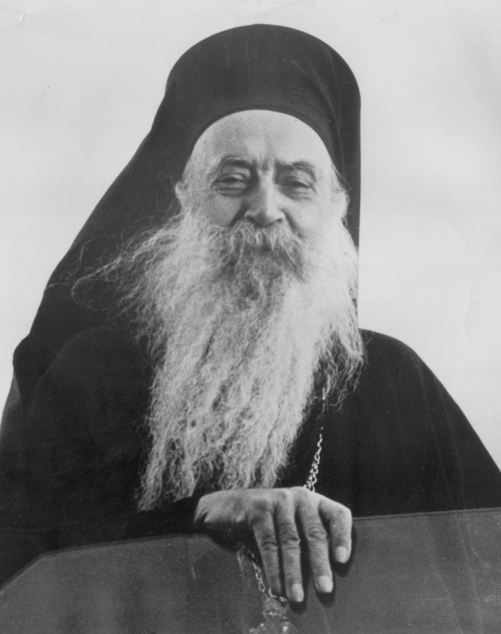Lately I’ve begun to publish a series of articles on the relationship between the Ecumenical Patriarchate and the United States government during the early Cold War period. The most recent of those articles focused on various statements of loyalty made by Patriarch Athenagoras to U.S. State Department officials. As I said in that article, context is vitally important: this was the early Cold War, and Athenagoras, like so many people, viewed it as a war of Good (USA) versus Evil (USSR). Patriarch Athenagoras viewed himself as a vital part of the American team — not a puppet, but a partner. In his eyes, the Ecumenical Patriarchate was a key player in the war against Communism, and one of the main priorities of his Patriarchate was to advance U.S. interests against the Soviet Union.
What follows is a complete transcription of a September 22, 1950 secret memorandum (now declassified, and linked to in my previous article) written by Frederick Merrill, the U.S. consul in Istanbul, describing an interview he had with Ecumenical Patriarch Athenagoras. This is just one of a many, many similar documents I recently received thanks to the efforts of my colleague Aram Sarkisian. CLICK HERE to download the original document.
***
SECURITY: SECRET
TO: Department of State
FROM: ISTANBUL 193 SEPTEMBER 22, 1950
REF: —
SUBJECT: INTERVIEW WITH THE PATRIARCH.
1. The Oecumenical Patriarch told me yesterday that he has now completed his reply to the Patriarch of Moscow’s “plea for peace” letter of last March. (cf Istanbul despatch 224, April 21.) Athenagoras said that the reply would be “satisfactory” and would include an interpretation of the term “peace” to mean something quite different from Alexis’ version. Upon my expression of interest, he said he would send me a copy as soon as it could be translated.
Athenagoras added that, notwithstanding, he was on good personal terms with Alexis as it was his continuing policy not to give cause for a break between Istanbul and Moscow, because it was his own belief that the Russian prelates were essentially opposed to the Communist regime. He said he hoped to develop gradually his personal influence with all Patriarchs and Bishops of the Orthodox Church, and in this way assist the crusade against Communism now being carried on by all Christian Churches.
Athenagoras mentioned that he had received a letter from the newly-elected Patriarch of Yugoslavia and that he had replied to it in the open mail in cordial terms, which he hoped would bring about a closer personal relationship between himself and Vikentije. He said his connections with the Church in Hungary were difficult, but that he was on good terms with the Patriarch in Bucharest and had a means of communication with him.
2. Athenagoras also spoke at some length of the situation of the Orthodox Church in the Middle East. The weakest spot of all, he said, was Alexandria and the only solution remain was to have the Patriarch thrown out. Although Chrystopher was an old man, he was still vigorous and extremely dangerous, in that he was definitely influenced by Communist agents and was planning a trip to the United States, via Canada, where (Canada) he was in contact with a Communist agent. He again intimated that the Greek and American Governments should intervene directly with him, Athenagoras, in order to give him the necessary excuse to correct the situation in Alexandria. Athenagoras takes every opportunity to talk on this particular problem — which seems to worry him greatly. (cf Istanbul despatch No. 76, February 18, 1950.)
The mission to the Patriarch of Antioch at Damascus foreseen in Embassy Athens’ despatch No. 189 of August 1, which is designed to offset the visit of the Metropolitan of Leningrad a month or so ago, is expected to depart in the near future. Athenagoras said he knew Bishop Gregory personally and that he was a rather decent sort, but naturally he had no alternative but to compromise with the Kremlin. He said he had almost finished a report of the Russian delegation’s activities in Syria and would give us a copy. The Patriarch appeared to take considerable interest in this mission and will undoubtedly send along both gifts and instructions to the Antioch Patriarchate.
3. These views of the Patriarch in Istanbul, expressed many times previously to American officials, are well known to the Department and appear to be in line with the general policy principles described in Mr. Michael Melas’ memorandum, attached to Istanbul despatch No. 29, January 14, 1950. However, he may now be making an increased effort to bring to bear his influence as the spiritual authority on whom all other Orthodox Churches depend. If true, this could be a reflection of his belief that he has now established himself satisfactorily with the new Turkish Government as well as an indication that the influences described in Embassy Athens’ despatch No. 189 are already at work.
For the Consul General:
[signed]
Frederick T. Merrill,
American Consul
Copies to:
Ankara
Athens
Belgrade
Cairo
Damascus
Moscow

One Reply to “Secret 1950 State Dept Memo on Ecumenical Patriarch”